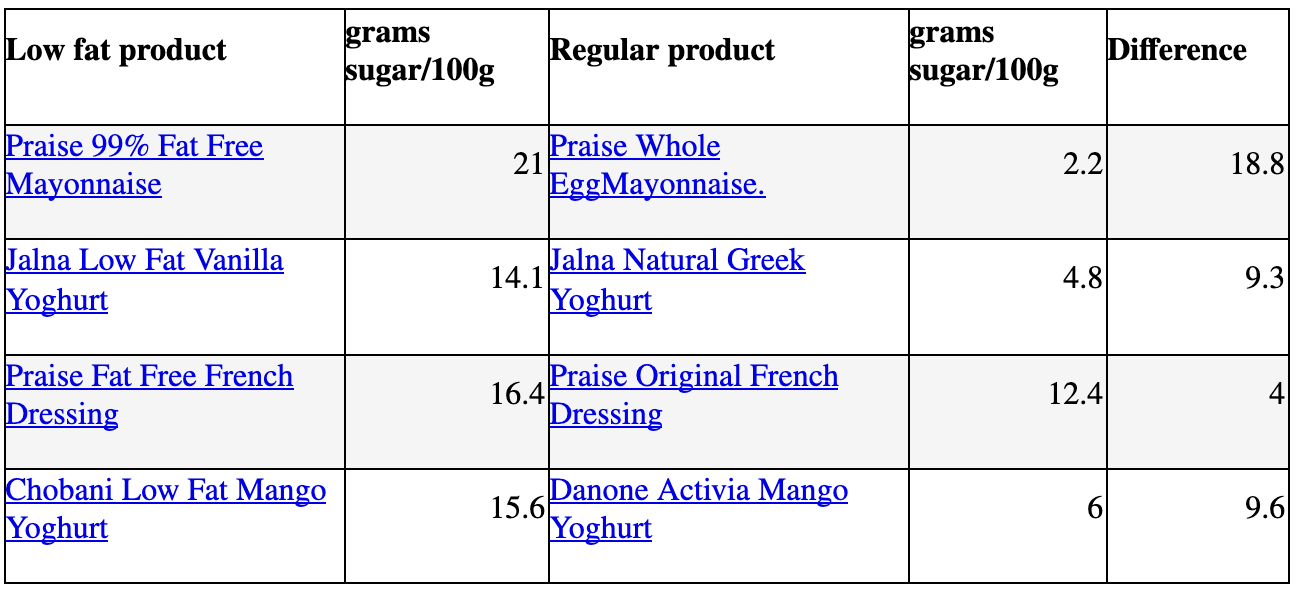MC Blog
Are you blinded by 'food jargon'?
This post originally appeared on Defeat Diabetes, Australia's leading program to send pre-diabetes and type 2 diabetes into remission, and is republished with their permission.
In an age of skyrocketing obesity, with a resulting health crisis, it’s hardly surprising so many of us are keen to shed a few kilos for health reasons.
The obesity crisis has seen a whole category of products that are 'low fat', 'reduced fat' or 'no fat'. Sounds good, right? But if healthy eating is the aim, it’s crucial to be able to stop manufacturers pulling the fat over our eyes when it comes to the sugar content of our food.
What's the deal with fat?
The fact of the matter is that fat actually helps us feel full. Studies show that fats play a part in helping create feelings that we’ve had enough to eat. Anyone who has ever sat down with a block of chocolate or a packet of biscuits knows that sugar works differently. Our bodies are hard wired to consume whatever sugar is on offer.
Our bodies need fat, with every cell in our bodies containing membranes which require fat. Many vitamins, like vitamin A, D, E and K, require fat to be metabolised. A diet that lacks enough fat can actually lead to serious health complications. Sugar, on the other hand, is stored by the body as fat if it isn’t used as energy.
This isn’t new knowledge. Scientists were investigating the links between sugar consumption and obesity way back in the 1970s. An investigation of documents by the Journal of the American Medical Association showed that the sugar industry actively conspired to cover up the science.
We blame sugar
That’s why some people refer to 'big sugar' in the same way as 'big tobacco'. As a New York Times article put it: “The sugar industry wasn’t just interested in creating uncertainty. It explicitly sought to villainize fat, and to place sole blame on it for coronary heart disease. The result was the proliferation of low-fat, high-carb diets, which many researchers argue has helped fuel the recent obesity boom.”
The term 'fat free' can also be used to healthwash a product that is already high in sugar. Sweetened condensed milk, for example, is loved by bushwalkers, soldiers, bakers of desserts and people who need to gain weight quickly because it represents one of the most energy dense foods available, with up to 321 calories per 100 grams. These calories come from sugar.
Nestle Skim Condensed Milk is marketed as “99% fat free”. True, it contains just 0.3 grams of fat per suggested serving size of 100 grams - but a whopping 60.9 grams of sugar. So this serving size would be nearly three times the recommended daily allowance of 24 grams. (Regular condensed milk contains 55.9 grams). If you let the 'fat free' label con you into thinking this is healthy, you’ve been healthwashed.

With so many 'low fat' products alarmingly high in sugar, a day of eating them could see our sugar consumption balloon – with disastrous effects for our health.
A breakfast of Morning Sun Fat Free Muesli contains 14% sugar, with a standard 60 gram serving loading us with 10 grams. Next, a low fat lunch option, like a serving of Woolworth’s own Low Fat Sweet Potato & Pumpkin Soup, contains another 10.2 grams.
Even your healthy dinnertime salad isn’t safe. Many sauces and condiments are high in added sugar, but 'fat free' or 'low fat' options are some of the worst offenders. Praise 99% fat free mayonnaise contains 21% sugar, so 20 grams on a salad would add another 4.2 grams.
After dinner, a serving of Parson’s Vanilla Creamed Rice is 98% fat free – but contains 21 grams of sugar. So a single day of 'low fat' consumption has resulted in 65.4 grams of sugar – almost three times the daily limit of 24 grams recommended by the World Health Organisation.
Don’t let food manufacturers use weasel words to pull the fat over your eyes. 'Fat free' does not necessarily mean healthy. It can often mean 'dangerously high in sugar'.
Join Australia's leading evidence-based and doctor-led program transforming the health of Australians. Start your free trial of the Defeat Diabetes Program today.
Comments
By accepting you will be accessing a service provided by a third-party external to https://menuconcepts.com.au/


